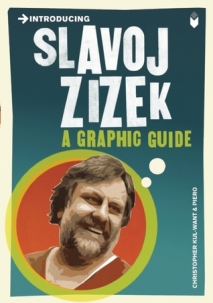
With text by Christopher Kul-Want and pictures by Piero, Introducing Slavoj Žižek: A Graphic Guide, a 2012 entry in Icon Books’ graphic introductions series, covers the life and thought of larger-than-life Slovenian philosopher Slavoj Žižek. His interests range widely, and he is the perfect figure for our atomised times; the text jumps from topic to topic in the same way its freewheeling subject throws out opinions about whatever in the culture catches his fancy.
His books combine with his personal appearances and films to create the ‘Slavoj’ persona. However, there is always a suspicion with ‘rock star’ intellectuals that depth may be sacrificed for breadth, lacking rigour in the quest to be topical or controversial (for example, anybody who argues ‘Darwin believed that the myriad designs of Nature are perfectly honed to do whatever they are meant to do’ does not understand Darwinism).
Appropriately then, Introducing Žižek doesn’t go into his ideas in depth, and the illustrations add little to the text. There is a good reading list for those who wish to delve further, but really Žižek is not the kind of thinker who can easily be captured in such a basic format. Skimming over the surface leaves too much of the underpinning scaffolding underexplained, and some background in philosophy is required to understand what he is saying.
In the end his ideas feel like an eclectic stew, allowing him to pick out whatever suits the topic he is addressing at a given moment with little regard to overall consistency. Also, he is a great fan of Jacques Lacan, so one’s attitude towards Žižek may depend on whether or not one considers psychoanalytic theory to have anything meaningful to say about the human condition, but he does draw on a broad array of philosophers, notably Hegel and Marx. Apparently he finds analytic philosophy ‘boring’, which is always a good sign.
Where his critiques of capitalism and consumerism are well-founded they do not appear particularly novel. He is certainly right about the need to be suspicious of the ideological role of popular culture as it determines our thoughts unconsciously in the service of capitalism, but we knew that already. Perhaps someone should buy him a gift subscription to New Left Review.
If Introducing Žižek encourages further exploration of his ideas – where they are worth exploring – it will have served its purpose. The reader may conclude that in much of what he says he is more self-serving prankster and poseur than serious thinker. A ‘dangerous philosopher’ as New Republic called him? I think the days when philosophers could be considered dangerous are past.
